Parenting Tips
Legal Guardianship: Do Your Parents Legally Own You?
Discover the truth about legal guardianship and whether your parents really own you, as we explore the responsibilities and rights involved.
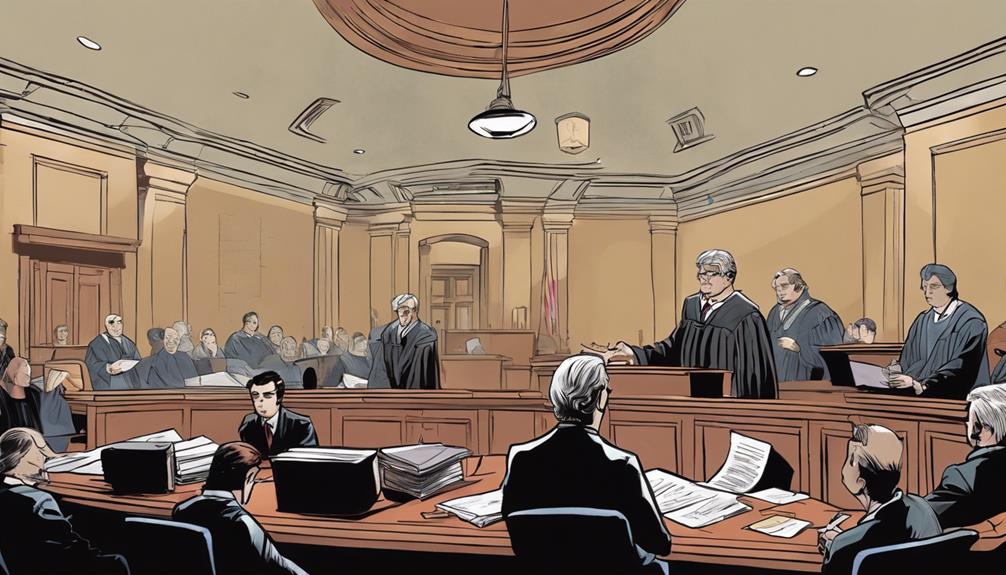
Under legal guardianship, your parents don’t own you. This ensures your **well-being**, growth, and rights. They have a big job keeping you safe and cared for while respecting your rights. It’s about what’s best for you, not ownership. By learning more about legal guardianship, you’ll see it’s about making sure you’re well-protected and supported as you grow.
Key Takeaways
- Legal guardianship does not imply ownership over children.
- Parents hold certain rights, but guardians have decision-making authority.
- Guardians prioritize the child's best interests and well-being.
- Children retain individual rights under guardianship.
- Guardians are responsible for fostering a child's development and protection.
Definition of Legal Guardianship
Legal guardianship is an essential legal concept. It refers to the formal relationship established through court proceedings where a guardian is appointed to oversee and make decisions for a minor child. This designation doesn't involve ownership of the child; instead, it focuses on the responsibilities and decision-making authority over the child's well-being.
While parents may retain certain rights even after a guardian is appointed, such as visitation and decision-making involvement, the appointment of a guardian doesn't mean parents give up ownership of the child. It's about safeguarding the child's best interests are protected in situations where a parent may be unable to provide care.
Legal guardianship serves as a temporary arrangement that can be put in place to protect a child's needs are met when a parent is facing challenges in fulfilling their parental duties. Understanding the role of a legal guardian and parental rights is crucial in managing the complexities of safeguarding a child's welfare.
Parental Responsibilities Versus Ownership
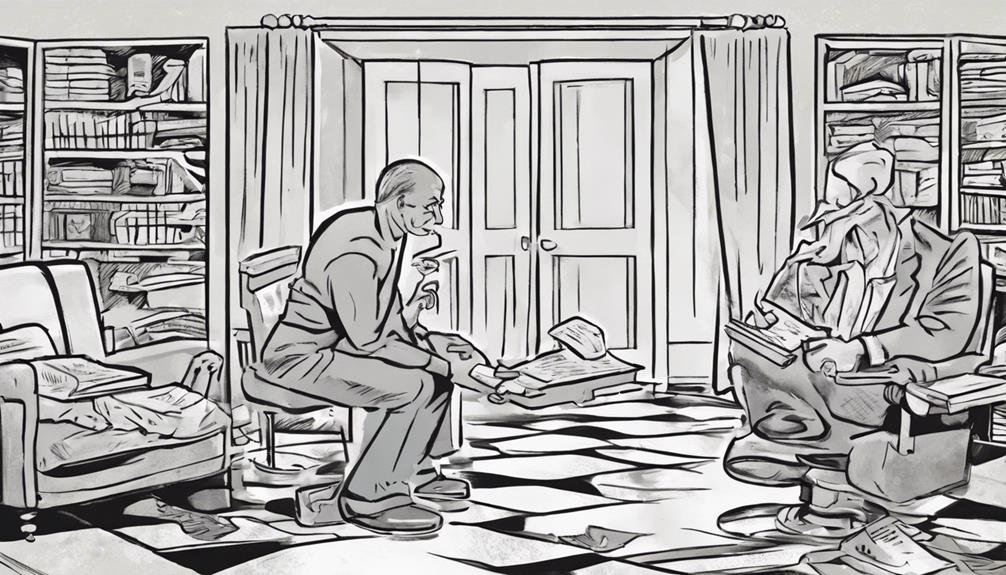
While parents don't legally 'own' their children, they do have crucial responsibilities to provide care and make decisions on their behalf. As a parent, your legal responsibilities include ensuring your child has stable relationships, receiving proper daily care, access to education, healthcare, and financial support.
It's important to understand that any property acquired by your child belongs to them, not you. This means you can't claim ownership of their belongings. While you may have some control over items provided for their support and maintenance, legal precedents and state laws emphasize your child's right to property ownership, which is distinct from your control.
Child's Legal Rights and Ownership
Children have the legal right to own property acquired through various means such as inheritance, gifts, or purchases. This means that items like toys, clothes, or even savings accounts opened in your name belong to you, not your parents. While parents are typically responsible for managing a child's possessions, the ownership remains with the child. Specific laws like the Uniform Transfers to Minors Act allow parents or guardians to control property transfers to minors, but the ultimate ownership still rests with the child. Understanding that as a minor, you have rights to the things you own, and no one, not even your guardian or parent, can take them away without a valid legal reason is crucial.
| Child's Property Rights | Description | Importance |
|---|---|---|
| Ownership of Possessions | Items acquired belong to child | Empowers child to make decisions about their belongings |
| Parental Control | Parents can manage child's property | Ensures responsible oversight while respecting child's ownership |
| Legal Protection | Laws safeguard child's property rights | Provides security and clarity regarding ownership |
Distinction Between Guardianship and Ownership
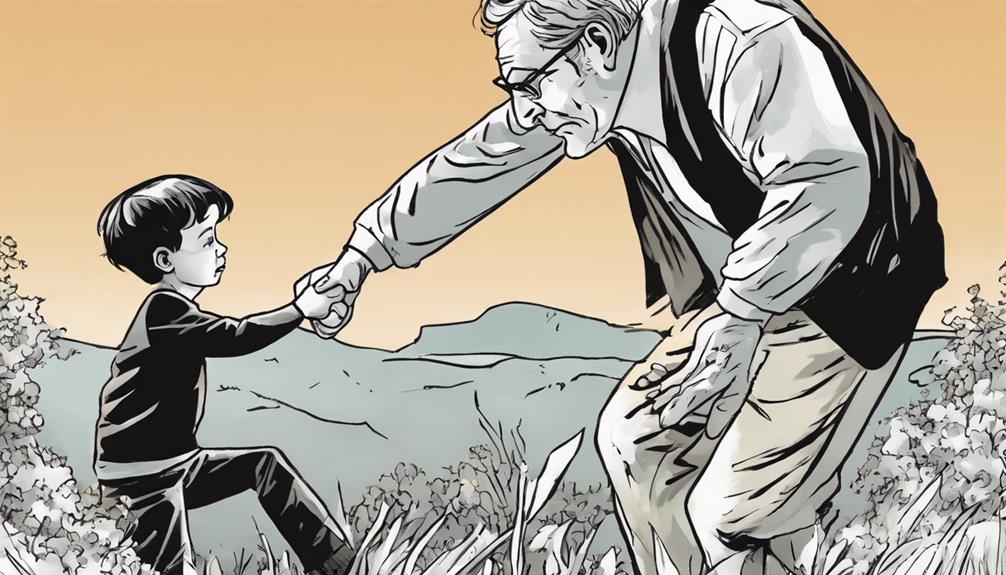
Let's clear up a common misconception: legal guardianship doesn't mean ownership. It's more about having the authority to make decisions for your well-being.
Legal Status Clarification
In understanding legal guardianship, it is crucial to clarify the distinction between guardianship and ownership of a child. Legal guardians, such as parents, are granted specific rights and responsibilities concerning the well-being and care of the child. To make this clearer, let's break down the differences between guardianship and ownership in the table below:
| Aspect | Guardianship | Ownership |
|---|---|---|
| Decision-making | Authority to make decisions for the child | Control over the child's possessions |
| Care and Protection | Focus on the child's well-being | Focus on asserting authority |
| Rights and Duties | Specific legal rights and responsibilities | Claim of ownership over the child |
Rights and Responsibilities
Understanding the distinction between legal guardianship and ownership is essential for defining the rights and responsibilities associated with caring for a child. In the domain of legal guardianship, individuals are granted decision-making authority over a child's well-being, encompassing responsibilities such as care, education, and financial support.
On the other hand, ownership implies possession or control over a person or property, focusing more on legal rights and control rather than caregiving duties. While parents may have legal guardianship rights over a child, it's important to note that they don't possess ownership of the child as they'd own property.
The differentiation between guardianship and ownership is deeply rooted in the legal framework that governs decision-making and responsibilities pertaining to children. By grasping this disparity, individuals can better understand the rights and duties involved in caring for a child under legal guardianship, ensuring that the child's well-being and best interests are prioritized within the confines of the law.
Impact of Legal Guardianship on Children

Children under legal guardianship experience significant impacts on their daily lives and overall well-being. This arrangement shapes how they're cared for and the decisions made on their behalf. Here are some key ways legal guardianship affects children:
- Legal Responsibility: The guardian takes on the legal responsibility for the child's welfare, guaranteeing they've a safe and nurturing environment to grow in.
- Best Interests: Decisions made by the guardian must always consider the child's best interests, including their physical, emotional, and educational needs.
- Individual Rights: Despite being under guardianship, children still retain their individual rights and identities, ensuring they're treated with respect and dignity.
Legal guardianship provides a support system for children in need while upholding their rights and well-being. It gives them a stable environment to thrive in, with caregivers who prioritize their best interests and secure their overall growth and development.
Legal Aspects of Parental Control

Ready to uncover the nitty-gritty of parental control? Let's chat about the rights and limits parents have, your legal autonomy as a child, and the distinction between guardianship and ownership.
Stay tuned for some eye-opening insights into the legal aspects of parental control!
Parental Rights and Limits
Parents' control over their children's possessions includes the authority to manage items such as computers, cars, and savings. It's important to understand the limits and rights that come with this responsibility when it comes to your belongings as a minor child.
Here are some key points to keep in mind:
- Parental Control: Your parents have the right to oversee and make decisions about your possessions, ensuring they're used responsibly and in line with their wishes.
- Ownership of Property: While parents can control certain aspects of your belongings, they can't claim ownership of property acquired by you, unless it's compensation for services you provided.
- Legal Recognition: Specific statutes like the Uniform Transfers to Minors Act acknowledge parental control over property transfers to minors, emphasizing the importance of distinguishing between property provided for support and property owned outright by the child.
Understanding these parental rights and limits is important for a harmonious relationship between you and your parents regarding your possessions.
Child's Legal Autonomy
When considering the legal aspects of parental control, it's essential to grasp the concept of a child's legal autonomy. Children have their own rights and protections under the law, separate from parental ownership. This means that while parents have the right to make decisions and provide care for their children, they don't legally own them.
Legal autonomy for children means they've control over their bodies and possessions. Laws recognize children as individuals with the right to make certain decisions for themselves, safeguarding them against parental overreach.
Parental control, thus, extends to guiding, nurturing, and protecting children, rather than owning them as property.
Understanding the boundaries of parental control and a child's legal autonomy is vital for fostering healthy relationships and promoting independence. By recognizing and respecting a child's rights within the legal process, parents can fulfill their responsibilities of care and guidance effectively.
Guardianship Vs Ownership
Legal guardianship distinguishes authority over a child's well-being from the concept of ownership in the domain of parental control. When it comes to guardianship versus ownership, it's crucial to grasp that your parents don't own you; instead, they've specific rights and responsibilities to guarantee your well-being and make decisions in your best interest.
Here are three key points to ponder:
- Child's Needs: Legal guardianship revolves around meeting a child's needs, ensuring their safety, education, and overall welfare. This responsibility entails making decisions that foster your development and protect your rights.
- Appoint a Guardian: In situations where parents are unable to care for their children, a guardian can be appointed by the court to take on the role of ensuring the child's needs are met and rights are upheld.
- Decision-Making: Guardianship allows for decision-making on behalf of a child, but it doesn't imply ownership. The focus remains on what's best for you and your growth, ensuring your well-being is the top priority.
Transition From Guardianship to Adulthood

As you turn 18 years old, a significant shift occurs in your legal standing and decision-making autonomy. Shifting from guardianship to adulthood means you gain control over your decisions and legal rights.
At this age, you become a legal adult, and your parents or guardians no longer have authority over you. This change involves reevaluating financial support and living arrangements, as you now have the right to make these decisions on your own.
Moving from guardianship to adulthood also brings about a shift in legal responsibilities. You're now accountable for your actions and decisions, and you have the right to enter into contracts, vote, and make medical decisions for yourself.
Understanding these changes in legal rights as you navigate this exciting phase of your life is important. Embrace your newfound autonomy and take steps to educate yourself on your rights and responsibilities as you transition into adulthood.
Legal Implications of Guardianship Decisions

Understanding the implications of guardianship decisions is essential for managing the legal responsibilities and rights involved in caring for a child. When the court is involved in determining guardianship, both the parent or guardian and the child may be affected in various ways:
- Parental Rights: In guardianship cases, parents may experience a shift in their rights. While they may lose certain decision-making powers, they still have the right to maintain a relationship with their child.
- Visitation Approval: The court's decision on guardianship can impact parental visitation rights. In some cases, court approval may be necessary for parents to visit their child.
- Parental Involvement: The extent of a parent's involvement in a child's life can be influenced by guardianship decisions. Legal guardianship grants authority over the child's well-being but doesn't automatically transfer ownership of the child to the guardian.
Protecting Children's Rights Under Guardianship
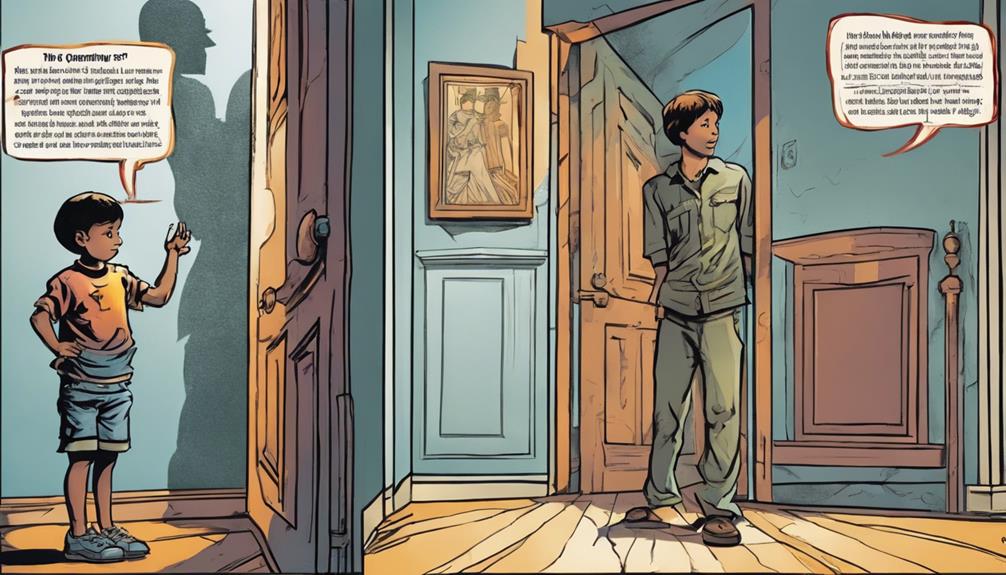
Ensuring children's rights are safeguarded under guardianship arrangements is paramount for their well-being and protection. While legal guardianship grants certain decision-making responsibilities to individuals other than biological parents, it doesn't equate to ownership.
Children under guardianship retain their individual rights and can't be owned by their guardians. The legal system places great emphasis on protecting children's well-being and rights in these situations. Guardians are required to act in the child's best interests and uphold their rights during their care.
This means that guardianship leads to the provision of proper care and protection for children, rather than control or ownership over them.
Frequently Asked Questions
What Are the Liabilities of Being a Guardian?
As a guardian, your responsibilities come with liabilities. These include ensuring the well-being of the person under your care, making decisions in their best interest, and following all legal requirements.
Failing to fulfill these duties can lead to financial obligations, legal consequences, and potential disputes. Prioritizing your role seriously and prioritizing the safety and welfare of the individual you're responsible for.
What Are the Disadvantages of Being a Guardian?
Being a guardian can have its challenges. You may find it tough to balance your own needs with those of the person you're caring for.
It can be a big responsibility, with emotional and financial burdens. You might face limitations on your decision-making and autonomy. Conflicts with the individual under your care may arise.
It's essential to consider all these factors before taking on the role of a guardian.
Do Your Parents Own You Legally?
Parents don't legally 'own' you; they've custodial rights. It's like being the captain of your ship, guiding you through life's waters.
They make decisions for you, but that's about responsibility, not ownership. Legal guardianship gives them authority to care for you, not to own you.
So, nope, legally, you're not anyone's property. You're your own person, with rights and protections.
What Is the Responsibility of the Guardian?
As a guardian, your responsibility is to protect and care for the person under your guardianship. You must make decisions in their best interests, ensuring their well-being, education, healthcare, and financial needs are met.
Advocating for their rights and welfare is vital, as you provide stability and support for their development. Your role is essential in safeguarding their safety and ensuring they thrive under your guidance.
Does Having a Parenting Plan Affect Legal Guardianship of a Child?
Having a parenting plan notarization requirements can greatly affect the legal guardianship of a child. It provides a clear outline of custody, visitation, and decision-making, helping to avoid conflicts. Notarization ensures the plan’s validity in court, ultimately impacting the legal guardianship and ensuring the child’s best interests are protected.
Conclusion
So, do your parents legally own you? The answer is no! Legal guardianship is about protection and care, not ownership.
Your rights as a child are important and should be respected. Remember, you aren't a possession, but a unique individual with your own thoughts, feelings, and dreams.
Your guardians are there to guide and support you as you grow and thrive. Embrace your independence and cherish the love and guidance your guardians provide.
Parenting Tips
Navigating the Hybrid Classroom: Tips for Success
Optimize your hybrid classroom experience with essential tips and strategies for seamless technology integration, engaging lessons, and fostering community connections.
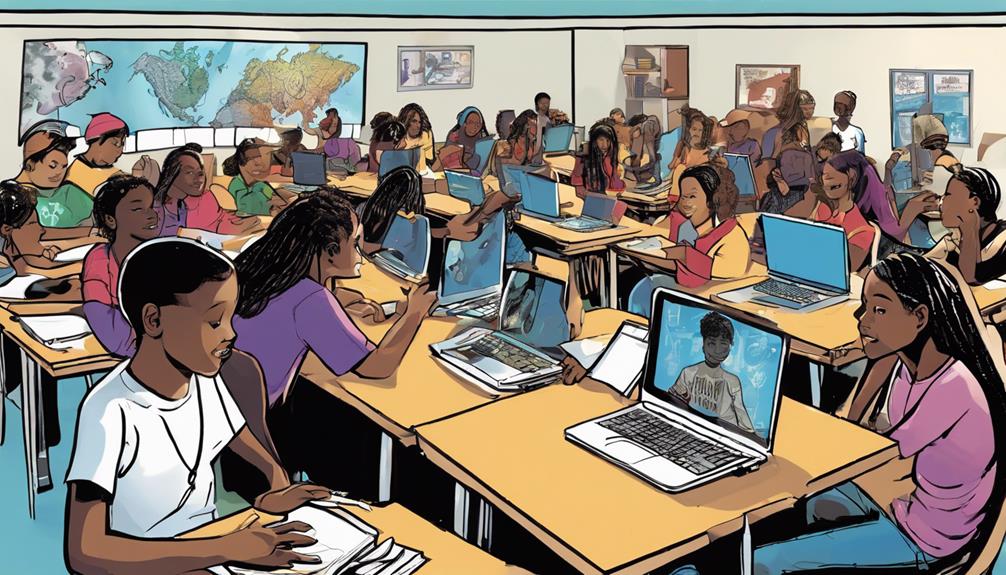
Managing a hybrid classroom means using **essential tech tools**, planning fun lessons, building connections, keeping students interested, and making good use of time. Use the right hardware, ensure everyone has a device, and help remote students with video tools. Plan lessons that mix both in-person and remote topics, and aim to make them fun. Create a sense of community to bridge the gap, encourage interaction, and use real-world applications to keep students engaged. Use time wisely by prioritizing activities and setting clear timelines. **Master** these strategies for hybrid classroom success. [Learn more about maximizing your hybrid classroom potential.](#)
Key Takeaways
- Integrate essential technology tools for seamless hybrid classroom operation.
- Meticulously plan engaging lessons for both in-person and remote learners.
- Foster a sense of community by encouraging interaction and participation.
- Boost student engagement with interactive activities and multimedia resources.
- Manage time effectively by prioritizing tasks and establishing clear timelines.
Technology Integration Essentials
Incorporating essential technology tools and devices is vital for seamless integration in the hybrid classroom setting.
To facilitate effective online classes, teachers and students must have appropriate hardware like cameras, screens, projectors, and microphones. Universal use of similar devices fosters collaboration and guarantees a smooth learning experience.
Remote students may require guidance on utilizing video conferencing tools to engage actively in lessons. It is essential to maintain traditional classroom management principles even in the virtual environment.
Mastering Lesson Planning

Efficient lesson planning is fundamental for successful navigation of the hybrid classroom environment. To master lesson planning effectively, teachers should consider the following:
- Organize: Meticulously plan and organize lessons to guarantee smooth delivery.
- Prioritize: Determine key topics for in-person and remote learning, balancing both environments.
- Engage: Create engaging activities that foster participation and interaction among all students.
Fostering Community Engagement
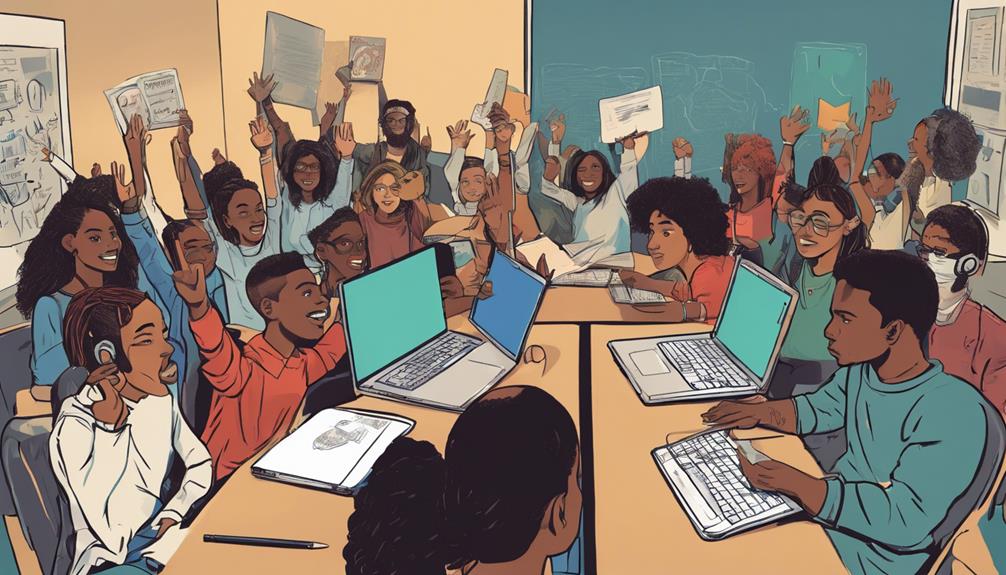
To cultivate a thriving learning environment in a hybrid setting, fostering community engagement is essential. Building a sense of community helps bridge the physical gap between in-person and remote learners. Encouraging interaction and participation beyond the curriculum is vital. Teachers play a pivotal role in modeling ideal conduct to enhance student engagement.
By implementing engagement tactics, such as promoting closeness, boosting morale, and ensuring psychological safety, students are more likely to actively participate in the learning process. Creating opportunities for both in-person and remote students to collaborate and engage with one another can greatly enhance the overall learning experience.
Boosting Student Engagement

Enhancing student engagement is pivotal in creating a dynamic and interactive learning environment within the hybrid classroom setting. To boost student engagement effectively, consider the following strategies:
- Implement interactive activities to stimulate interest and participation.
- Utilize multimedia resources to cater to diverse learning preferences.
- Provide real-world applications of concepts to enhance relevance and motivation.
These approaches can help students feel more connected to the material and foster a sense of active involvement in their learning process.
Efficient Time Management

Managing time effectively in a hybrid classroom requires meticulous planning and coordination to optimize student learning experiences. Efficient time management guarantees the smooth flow of lessons and activities, maximizing the benefits of both in-person and remote learning. To assist in this endeavor, consider the following strategies:
| Time Management Strategies | Description | Benefits |
|---|---|---|
| Prioritize Tasks | Organize tasks by importance | Enhances productivity |
| Set Clear Deadlines | Establish clear timelines | Promotes accountability |
| Utilize Technology Tools | Use tools like calendars | Facilitates organization |
| Create Daily Schedules | Plan daily activities | Improves time allocation |
| Review and Adjust | Regularly assess progress | Allows for timely changes |
Frequently Asked Questions
How Can Teachers Ensure Equal Participation Between In-Person and Remote Students?
Teachers can promote equal participation between in-person and remote students by fostering an inclusive environment through balanced engagement strategies, involving all students in discussions, interactive activities, and collaborative tasks. Regularly monitoring and encouraging participation are key.
What Are Some Effective Strategies for Managing Student Distractions in a Hybrid Classroom?
In a hybrid classroom, managing student distractions is essential for maintaining focus. Implement strategies like setting clear expectations, utilizing interactive tools, fostering student accountability, and providing structured breaks to enhance engagement and minimize disruptions.
How Can Teachers Encourage Peer-To-Peer Interaction in a Hybrid Setting?
To foster peer-to-peer interaction in a hybrid setting, teachers should facilitate collaborative activities, group discussions, and teamwork tasks that engage both in-person and remote students. Encouraging communication through various platforms can enhance social connections and learning outcomes.
What Tools Can Be Used to Track Student Progress and Engagement in Real-Time?
In the dynamic landscape of hybrid education, utilizing tools like interactive dashboards, real-time polling software, and AI-driven analytics can enable educators to monitor student progress and engagement with unparalleled precision, fostering a conducive learning environment.
How Should Teachers Handle Technical Issues During Live Hybrid Classes?
During live hybrid classes, teachers should promptly address technical issues by calmly troubleshooting or seeking immediate technical support to minimize disruptions. Clear communication, preparation with backup plans, and familiarity with technology are key to maintaining the flow of instruction.
Conclusion
To sum up, successfully managing the hybrid classroom requires strategic planning and effective implementation of technology tools, lesson plans, community engagement, student involvement, and time management.
One interesting statistic to note is that according to a recent survey, 76% of teachers believe that integrating technology in the classroom has improved student learning outcomes.
By following these essential tips and strategies, educators can create a cohesive learning environment that meets the needs of both in-person and remote students.
Parenting Styles
Balancing Act: Authoritative Parenting Vs Permissive Parenting
Unlock the secrets to raising well-adjusted kids by understanding the delicate balance between authoritative and permissive parenting styles.
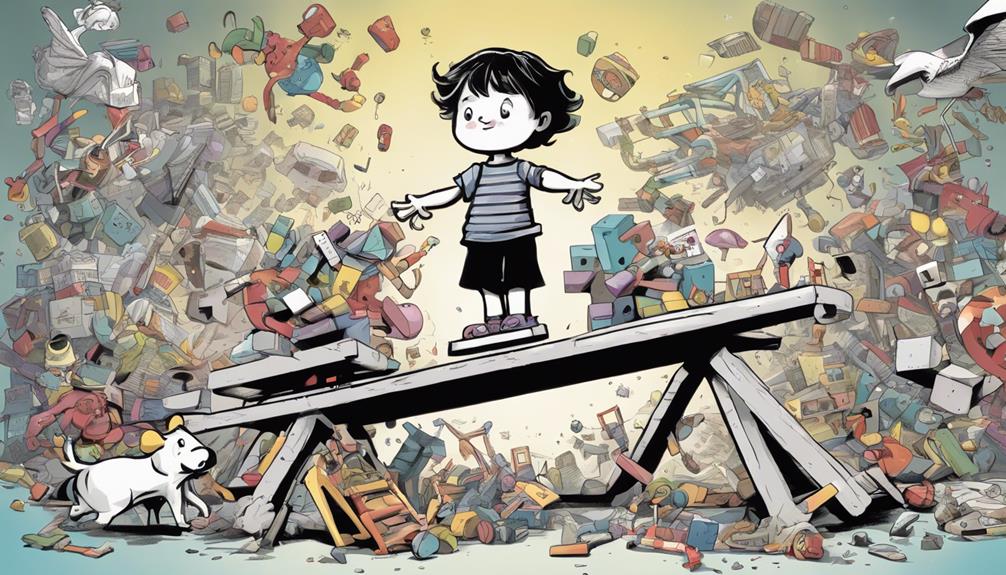
Balancing the tricky act of raising kids means juggling growth support and setting rules, making one choose between **authoritative** and **permissive** parenting. Permissive parents give lots of **freedom**, but it might lead to poor discipline. **Authoritative** parents create a **nurturing** environment, boosting social, cognitive growth, and better **resilience**. Clear rules with loving guidance are key. Learn these methods for raising well-rounded kids.
Key Takeaways
• Authoritative parenting balances warmth and structure, promoting social and cognitive development, whereas permissive parenting lacks discipline and boundaries.
• Setting clear rules and boundaries is essential to help children learn decision-making skills and develop self-regulation.
• Permissive parenting can lead to rebellious behavior, impulsiveness, and lower self-control, whereas authoritative parenting fosters resilience and better academic performance.
• Finding a balance between autonomy and guidance is crucial, as it enables children to develop important life skills and make informed decisions.
• Consistency is key in setting boundaries, as it provides a sense of structure and security, promoting growth, discipline, and accountability.
Understanding Parenting Styles
When it comes to raising children, you'll likely encounter two dominant parenting styles: authoritative and permissive, each with its own set of characteristics and outcomes.
As a parent, understanding these styles is important in shaping your child's development. The authoritative parenting style emphasizes a balance of warmth and structure, promoting children's social and cognitive development. This approach has been linked to higher self-reliance, resilience, and better academic performance in children.
On the other hand, the permissive parenting style allows for freedom and autonomy but may lead to children lacking discipline and important life skills. This approach can result in more rebellious behavior, impulsiveness, and lower self-control in children.
It's crucial to recognize that both styles have their strengths and weaknesses. Striking a balance between the two is necessary in fostering a nurturing environment that encourages growth and development.
The Importance of Balance

Often, parents struggle to find the sweet spot between providing guidance and giving their children the freedom to make choices, but achieving this balance is essential for fostering healthy development.
As you navigate the complexities of parenting, you'll need to strike a balance between setting clear rules and boundaries while allowing for flexibility. This balancing act is vital for children to learn boundaries and develop decision-making skills.
By providing structure and guidance, you'll help your children develop independence and responsibility. However, if you're too rigid, you may stifle their growth. On the other hand, if you're too lenient, they may lack direction.
The key is to find a balance that allows for autonomy while still providing guidance. By doing so, you'll raise well-adjusted and self-reliant children who are equipped to make informed decisions.
Authoritative Parenting Explained

By embracing authoritative parenting, you'll create an environment where your child can thrive, as this approach expertly balances warmth and discipline to promote healthy development. This style of parenting is all about finding a balance between being responsive to your child's needs and setting clear boundaries. By doing so, you'll foster open communication, independence, and responsibility in your child.
| Aspect | Description | Benefit |
|---|---|---|
| Clear Expectations | Setting clear rules and consequences | Encourages responsibility and accountability |
| Open Communication | Encouraging open dialogue and active listening | Fosters healthy relationships and trust |
| Balanced Discipline | Combining warmth and discipline | Promotes healthy child development and self-esteem |
As an authoritative parent, you'll provide guidance and support while allowing your child to make choices within reasonable limits. This approach has been shown to lead to higher self-esteem, better social skills, and academic success in children. By adopting an authoritative parenting style, you'll create a nurturing environment that promotes healthy child development and sets your child up for long-term success.
The Risks of Permissive Parenting
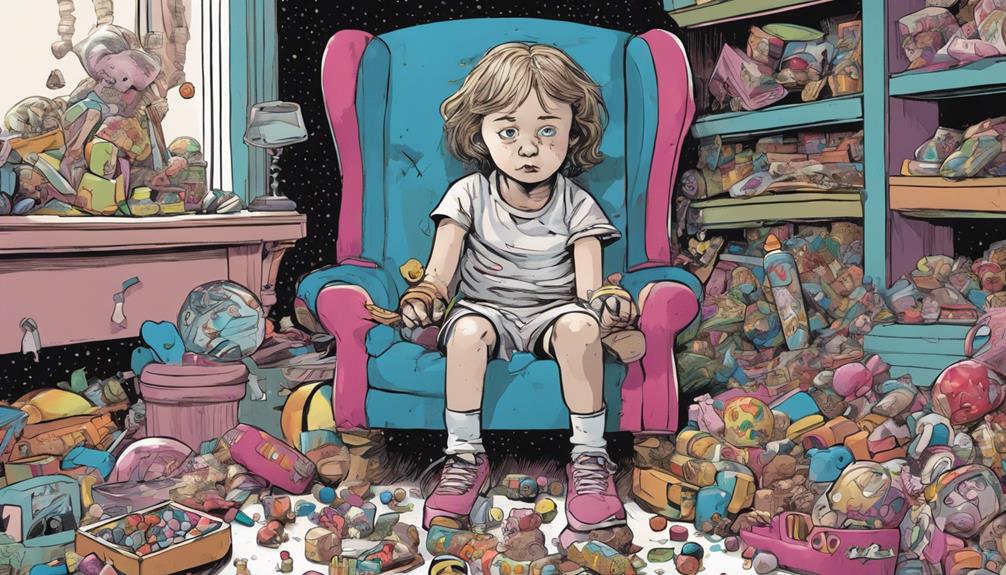
As you explore the risks of permissive parenting, you'll discover that this approach can lead to a lack of boundaries, increased entitlement, and behavioral problems in children.
Without clear guidelines and discipline, kids may develop an excessive sense of self-importance, making them more prone to rebellious and impulsive behavior.
Lack of Boundaries
When children are given too much freedom without guidance, they may struggle to develop self-regulation skills, leading to a lack of boundaries that can have lasting effects on their development. As a parent, you may think you're giving your child the freedom to make their own choices, but in reality, you're depriving them of the structure and discipline they need to thrive.
Permissive parenting often lacks clear boundaries, allowing children to make decisions without guidance, which can hinder their ability to develop self-regulation skills.
This lack of boundaries can have serious consequences, including:
- Behavioral problems and academic underachievement
- Difficulty in social interactions and forming healthy relationships
- Increased entitlement and a sense of expectation without effort
- Struggles with discipline and coping mechanisms in the face of adversity
Increased Entitlement
Raising children with permissive parenting, you inadvertently nurture a sense of entitlement, where they come to expect privileges and possessions without understanding the value of hard work and effort. This lack of boundaries and structure can lead to entitled behaviors, as children assume they deserve everything without putting in the effort.
Without rules and consequences, children may struggle to accept disappointment or setbacks, as they're used to getting what they want, when they want it. Permissive parenting fosters a mindset where children feel entitled to privileges and possessions without understanding the concept of earning or deserving them.
Research shows that children raised with permissive parenting are more likely to exhibit entitled behaviors and struggle with accepting disappointment. By not setting clear boundaries and expectations, you may unintentionally create an environment where your child develops an exaggerated sense of entitlement.
This can lead to difficulties in their personal and professional lives, as they struggle to adapt to the realities of the world outside the comfort of their childhood home.
Behavioral Problems
By giving your child too much freedom and too little discipline, aren't you inadvertently paving the way for behavioral problems down the line? Permissive parenting can have serious consequences, including increased impulsivity and aggressiveness in children. Without proper boundaries and discipline, kids may struggle with self-regulation, leading to reckless decision-making and a lack of self-control.
- Children may exhibit rebellious behavior and engage in risky activities, such as heavy drug use.
- Lack of structure and discipline can result in poor academic performance and underdeveloped social skills.
- Permissive parenting can lead to increased aggression and hostility in children.
- Without clear rules and boundaries, children may struggle to develop essential life skills, such as self-regulation and responsibility.
Setting Boundaries Effectively

As you navigate the complexities of parenting, you'll find that setting boundaries effectively is essential for establishing a sense of structure and guidance for your child.
By setting clear expectations, establishing healthy limits, and maintaining consistency, you can create an environment that fosters growth, discipline, and security.
Clear Expectations Matter
Establishing clear expectations is essential in authoritative parenting, as it enables children to understand their boundaries and responsibilities, fostering a sense of security and structure in their lives. As a parent, you set the tone for your child's development by providing a clear understanding of what's expected of them.
This approach differs significantly from permissive parenting, where the lack of clear boundaries can lead to confusion and inconsistency for children. By setting clear expectations, you build trust and respect with your child, helping them develop self-discipline and decision-making skills.
- You help your child feel safe and secure by providing a sense of structure and routine.
- Clear expectations promote healthy boundaries, allowing your child to understand their role and responsibilities.
Without clear expectations, children may feel lost and insecure about their roles. By setting clear expectations, you empower your child to make informed decisions and take ownership of their actions.
Set Healthy Limits
Setting healthy limits by defining and consistently enforcing clear, specific rules that promote a sense of security and structure for your child is vital.
As a parent, establishing a parenting style that balances freedom with boundaries is necessary, allowing your child to thrive in a stable environment. Setting boundaries effectively is critical in teaching your child the importance of responsibility, accountability, and respect for themselves and others.
By setting healthy limits, you're providing a sense of safety, stability, and predictability in your child's life. This, in turn, helps them develop self-discipline, respect for rules, and decision-making skills.
When you set clear boundaries, your child will understand what's expected of them and the consequences of not meeting those expectations. This authoritative parenting style allows your child to grow and develop in a structured environment, where they can learn and make mistakes without feeling overwhelmed or lost.
Consistency Is Key
What makes boundaries truly effective is the consistency with which you enforce them, and deviating from this consistency can lead to confusion and behavioral issues in children. As a parent, it's important to establish clear and consistent rules, so your child understands what's expected of them.
This consistency helps create a sense of security and structure, allowing your child to thrive.
When setting boundaries, it's vital to establish consequences for rule violations, promoting accountability and teaching your child that actions have repercussions. Inconsistently enforcing boundaries can lead to confusion, making it challenging for your child to understand what's expected of them.
Some key takeaways to keep in mind:
- Consistency is key to effective boundary setting
- Clear rules help children understand expectations
- Establishing consequences promotes accountability
- Inconsistent boundaries can lead to confusion and behavioral issues
Encouraging Independence Safely

As you work towards raising an independent child, you must balance the need for autonomy with the need for safety and guidance. Authoritative parenting encourages independence by setting clear expectations and providing guidance, allowing your child to grow while maintaining a safe environment.
In contrast, permissive parenting may allow independence, but it lacks structure and can lead to negative outcomes. To guarantee your child's independence is both healthy and safe, it's crucial to establish clear boundaries and provide ongoing support and guidance.
This delicate balance allows your child to develop a sense of autonomy while minimizing potential risks. By setting appropriate limits and offering emotional support, you can foster a sense of independence that's both empowering and safe.
Navigating Teenage Rebellion
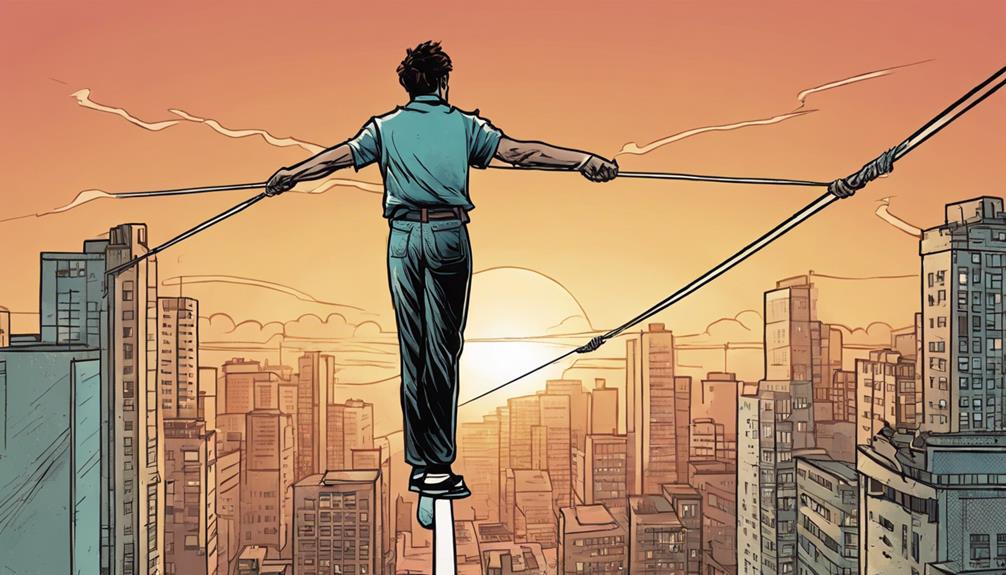
During the tumultuous teenage years, you'll likely face a period of rebellion, but the secret to managing this phase lies in the parenting approach you've established. If you've adopted a permissive parenting style, you may find yourself dealing with more frequent and intense rebellious behavior. This is because permissive parents often fail to set clear boundaries and consequences, leading teens to engage in risky behaviors and act out.
On the other hand, authoritative parents, who balance structure and warmth, are more likely to navigate teenage rebellion constructively. By establishing clear expectations and consequences, authoritative parents help teens understand the reasoning behind the rules and develop self-regulation skills.
Here are some key differences between permissive and authoritative parenting:
- Permissive parents often struggle to set boundaries, leading to power struggles with their teens.
- Teens in permissive households are more likely to engage in risky behaviors, such as substance abuse or delinquency.
- Authoritative parents maintain a strong, loving relationship with their teens, reducing the likelihood of rebellion.
- Clear consequences and open communication help authoritative parents guide their teens through the rebellious phase.
Building Resilience in Teens
By adopting an authoritative parenting approach, you can help your teenager develop resilience, an essential life skill that enables them to effectively cope with stress, challenges, and setbacks. This approach provides a balance of structure and support, allowing teens to learn problem-solving skills and emotional regulation. In contrast, permissive parenting may hinder resilience in teens by lacking necessary boundaries and discipline.
| Parenting Style | Impact on Resilience |
|---|---|
| Authoritative | Fosters resilience through structure and support |
| Permissive | Hinders resilience due to lack of boundaries and discipline |
| Authoritative | Builds resilience, enabling teens to navigate life's obstacles with confidence |
Long-Term Effects of Parenting
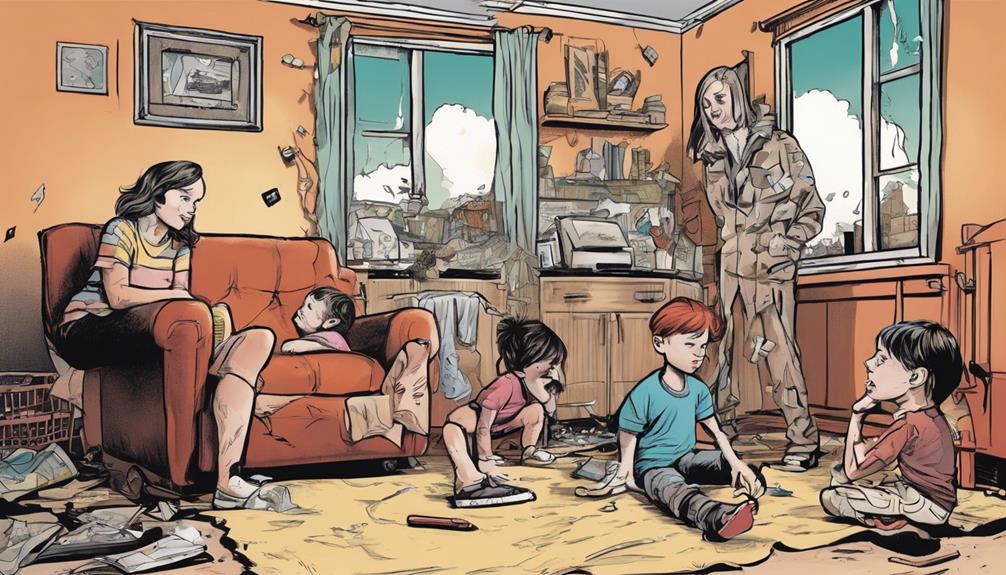
Your parenting style has a lasting impact on your child's future, shaping their academic performance, social skills, and self-esteem in profound ways. The long-term effects of your parenting style will influence the person they become, and it's crucial to understand the consequences of your approach.
Research has shown that authoritative parenting leads to positive outcomes, such as higher academic achievement, better social skills, and increased self-esteem.
On the other hand, permissive parenting can have negative consequences, including:
- Increased impulsivity and aggression
- Difficulty forming healthy relationships
- Lack of discipline and poor self-regulation
- Struggles with authority figures
In contrast, authoritative parenting has been linked to lower rates of substance abuse, higher levels of resilience, and better coping mechanisms in adulthood.
Frequently Asked Questions
What Is the Most Balanced Parenting Style?
You're likely wondering what the most balanced parenting style is.
According to child development experts, it's authoritative parenting, which combines warmth and setting limits to empower children. This approach encourages open communication, respect for children's needs, and clear expectations, promoting responsibility, independence, and secure self-development.
Research shows that children raised with authoritative parenting have better social and cognitive skills, self-reliance, and resilience.
What Is the Difference Between Authoritative Parenting and Permissive Parenting?
As you navigate the complexities of parenting, you're likely to encounter two distinct approaches: authoritative and permissive parenting.
The key difference lies in their contrasting philosophies. Authoritative parenting strikes a balance between setting clear boundaries and offering emotional support, while permissive parenting prioritizes freedom and flexibility.
You'll notice that authoritative parents foster independence and self-discipline, whereas permissive parents may inadvertently create entitled and impulsive children.
What Is the Middle Between Authoritarian Parenting and Permissive Parenting?
You're likely familiar with the extremes of authoritarian and permissive parenting, but what about the middle ground?
The answer lies in authoritative parenting, which strikes a balance between structure and responsiveness. This approach combines warmth and limits, providing a nurturing environment while setting clear expectations and boundaries.
What Are the 4 Types of Parenting Styles?
You're likely aware that parenting styles vary, but did you know there are four main types? According to psychologist Diana Baumrind, these styles are authoritarian, authoritative, permissive, and neglectful.
Each style has distinct characteristics, effects on children's behavior, and implications for their emotional development and well-being. Understanding these differences can help you make informed decisions about your parenting approach.
What are the key differences between Authoritative and Permissive Parenting styles?
When it comes to parenting, the authoritative vs permissive parenting styles are distinct. Authoritative parenting is characterized by setting clear expectations and boundaries while being nurturing. On the other hand, permissive parenting involves being more lenient and indulgent, often lacking clear guidelines. Both styles have different impacts on children’s behavior and development.
Conclusion
As you navigate the complexities of parenting, remember that striking a balance between authoritative and permissive approaches is essential. Research suggests that parents who adopt an authoritative style, characterized by warmth, communication, and boundaries, raise children with better social and emotional skills.
In fact, a staggering 75% of children from authoritative homes exhibit higher self-esteem and fewer behavioral problems. By embracing a balanced approach, you'll empower your child to thrive in an ever-changing world.
Parenting Tips
Unleash Your Public Speaking Potential With Confidence
Dive into mastering public speaking with confidence by learning essential techniques to captivate your audience and overcome stage fright.

Boost your public speaking skills by nailing the basics. Know your audience and design a clear speech layout. Tackle stage fright with deep breaths and expressive body language. Handle Q&A sessions calmly and confidently. Use visual aids to make your point stronger. These tips will unlock your public speaking potential and skyrocket your confidence.
Key Takeaways
- Practice speaking in front of a mirror multiple times for confidence.
- Utilize deep breathing and visualization techniques to overcome stage fright.
- Tailor your speech to connect with the audience on a personal level.
- Embrace non-verbal communication through eye contact and confident body language.
- Use clear speech structure with a compelling opening and strong conclusion.
Preparation for Public Speaking
Preparing meticulously for public speaking is essential for delivering a successful and impactful speech. Researching audience demographics, interests, and knowledge levels is vital. Understanding the importance of public speaking for communication skills, confidence, career growth, leadership, and effective idea conveyance is fundamental.
Practice speaking in front of a mirror and rehearse multiple times to build confidence. Creating a clear speech structure and tailoring content to connect on a personal level are key components. By focusing on these preparation steps, speakers can enhance their delivery and captivate their audience effectively.
Mastering Speech Structure
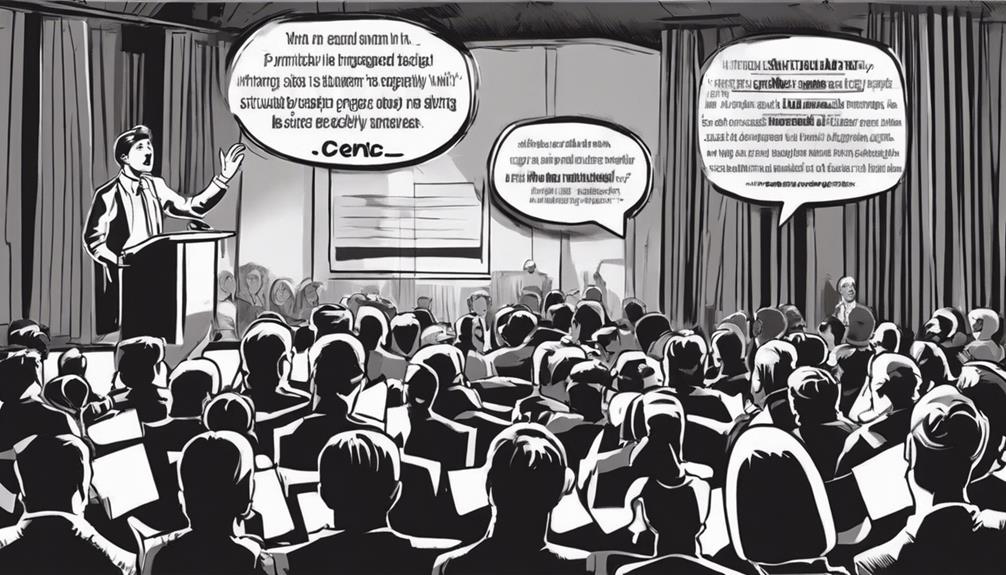
To excel in public speaking, mastering the structure of your speech is paramount for engaging and effectively conveying your message to the audience.
Begin with a compelling opening to grab attention, followed by a clear introduction of the main points. Organize these points logically, supporting them with relevant examples or stories. Guarantee a smooth shift between sections to maintain coherence.
End with a strong conclusion that reinforces your key message and leaves a lasting impact. Practice your speech multiple times to familiarize yourself with the content, tone, pace, and body language.
Embrace non-verbal communication through eye contact, confident posture, and effective gestures. Utilize visual aids sparingly to enhance, not overpower, your message.
Overcoming Stage Fright

Conquering stage fright is an essential aspect of delivering a successful public speech, requiring mastery of self-confidence and effective coping strategies. When facing stage fright, deep breathing exercises and visualization techniques can help calm nerves. It is important to focus on the message, engage the audience, and start with a strong opening. Enhancing presence through confident body language, eye contact, gestures, and voice modulation can also alleviate anxiety. Avoiding fidgeting, speaking clearly, varying pitch, and controlling the pace of speech are key strategies to overcome stage fright. Here is a table summarizing key points:
| Stage Fright Coping Strategies | Examples | Effectiveness |
|---|---|---|
| Deep breathing exercises | Diaphragmatic breathing | Calms nerves |
| Visualization techniques | Imagining a successful speech | Boosts confidence |
| Focus on the message | Engage with the audience | Reduces anxiety |
| Confident body language | Maintaining good posture | Enhances presence |
| Voice modulation | Varying pitch and pace | Controls nervousness |
Handling Q&A Sessions
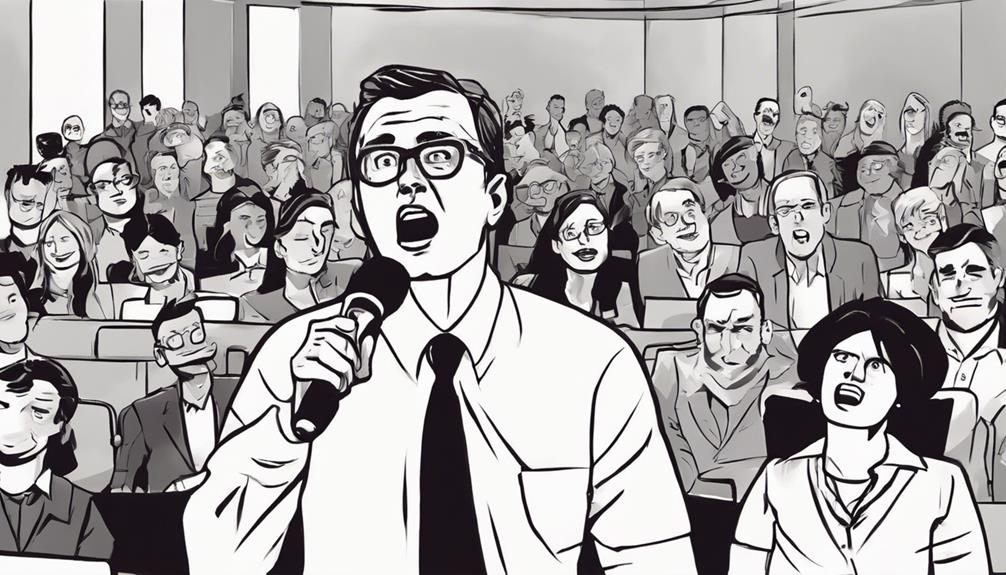
When moving from delivering a speech to interacting with the audience in a Q&A session, it is important to maintain composure and actively listen to questions being posed.
During Q&A sessions, follow these key strategies:
- Listen Carefully: Pay close attention to each question to provide relevant responses.
- Remain Calm: Stay composed and confident, even if faced with challenging or unexpected queries.
- Engage with Gratitude: Thank the audience for their questions and show appreciation for their participation.
Visual Aids and Message Reinforcement

Utilizing visually appealing aids is pivotal in reinforcing the message delivered during a public speech. Visual aids, such as slides, props, or multimedia presentations, serve to enhance audience understanding and retention of key points.
When incorporating visual elements, it is essential to keep them simple, clear, and complementary to the spoken content. Overloading the audience with visuals can distract from the message, so it's essential to strike a balance that guarantees a memorable speech delivery.
Effective non-verbal cues, gestures, and body language can further reinforce the intended message, creating a cohesive and impactful presentation. Establishing a strong presence on stage through confident posture, eye contact, and appropriate hand movements enhances the overall delivery of the speech.
Frequently Asked Questions
How Can I Effectively Engage a Diverse Audience?
To effectively engage a diverse audience, tailor your content to resonate with their backgrounds and interests. Utilize engaging storytelling, interactive elements, and inclusive language. Encourage participation, listen actively, and adjust your delivery to guarantee everyone feels acknowledged and valued.
What Are Some Strategies to Handle Technical Difficulties During a Presentation?
In the field of public speaking, handling technical glitches demands a calm demeanor, quick thinking, and preparedness. Confirm backup plans for equipment failures, practice with the technology, and maintain composure to troubleshoot effectively.
How Do I Maintain Audience Interest Throughout a Longer Speech?
To maintain audience interest throughout a longer speech, engage them with compelling stories, interactive elements, and relevant examples. Vary your tone, pace, and delivery to keep them attentive. Use visuals sparingly to supplement key points and enhance message retention.
What Are Some Tips for Incorporating Humor Into a Serious Speech?
Incorporate humor strategically by using relevant anecdotes, witty remarks, or light-hearted observations to break tension, engage the audience, and make complex topics more digestible. Balance humor with professionalism to maintain credibility and impact.
How Can I Address Audience Skepticism or Resistance During a Presentation?
To address audience skepticism or resistance during a presentation, employ strategic storytelling, provide credible evidence, acknowledge opposing viewpoints respectfully, and engage in active listening. Build trust by establishing common ground and demonstrating empathy towards differing perspectives for a more receptive audience.
Conclusion
To sum up, mastering the art of public speaking requires careful preparation, confident delivery, and effective message reinforcement. By honing speech structure, overcoming stage fright, and utilizing visual aids strategically, individuals can unlock their full potential as speakers.
Embracing these practices will not only enhance communication skills but also leave a lasting impact on the audience. With dedication and practice, anyone can become a compelling and confident public speaker.
-

 Parenting Styles1 week ago
Parenting Styles1 week agoWorst Parenting Style: Impact on Child Development
-
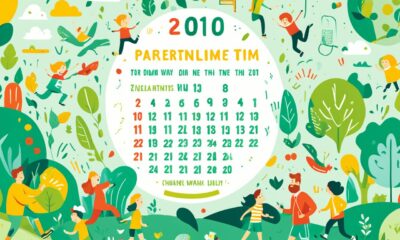
 Parenting Styles1 week ago
Parenting Styles1 week ago2023 Indiana Parenting Time Guidelines Update
-

 Vetted7 days ago
Vetted7 days ago15 Best Books on Step Parenting Every Blended Family Needs to Read
-
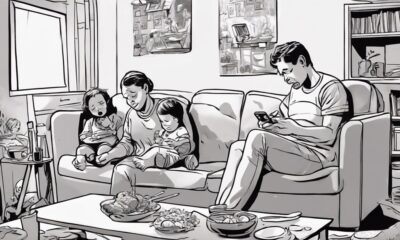
 Parenting Tips6 days ago
Parenting Tips6 days agoUnequal Responsibilities: When One Parent Does All the Parenting
-

 Parenting Tips1 week ago
Parenting Tips1 week agoFostering Love: How Much Do You Get Paid for Foster Parenting?
-

 Vetted22 hours ago
Vetted22 hours ago15 Best Co-Parenting Books Every Parent Should Read for Successful Co-Parenting
-

 Vetted6 days ago
Vetted6 days ago15 Best Parenting Books of All Time Every Parent Should Read
-

 Vetted6 days ago
Vetted6 days ago15 Best Books for Gentle Parenting Every Parent Should Read



















